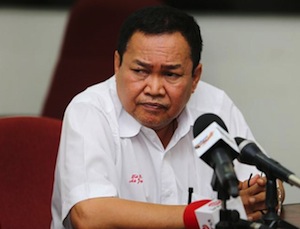Ibrahim Ali is not the law, lawyers say
(Malay Mail Online) – A constitutional restriction on proselytisation to Muslims does not entitle Perkasa’s Datuk Ibrahim Ali to threaten to burn Malay-language bibles, said lawyers critical of Putrajaya’s refusal to prosecute the Malay rights leader.
While acknowledging that Article 11(4) of the Federal Constitution prohibits the preaching of non-Islamic faiths to Muslims, they said the powers to enforce such curbs were conferred to federal and state authorities, not private citizens.
“Ibrahim Ali’s statement is clearly not federal or state law,” criminal defence lawyer Joshua Tay from Bon Advocates told Malay Mail Online this week.
“Even if the context of the statement is made within the spirit of Article 11(4), it’s not a defence because one of the ingredients of Section 298 (of the Penal Code) is the intention to wound the religious feelings of another,” the lawyer added.
In Penang last year, Perkasa president Ibrahim allegedly urged Muslims to torch Malay-language bibles that refer to God as “Allah”, an Arabic word commonly used by Christians in the Middle East and East Malaysia.
De facto law minister Nancy Shukri said in a statement Thursday that the Attorney-General’s Chambers had decided not to charge Ibrahim, who was investigated under Section 298 of the Penal Code, because the context of his speech was in line with the spirit of the Federal Constitution’s Article 11(4).
Nancy also told Parliament earlier this week that the police had concluded that the Malay rights group leader was merely defending the sanctity of Islam, and had not intended to create chaos.
According to the minister, the police investigation had also found that Ibrahim’s statement was directed at individuals who purportedly distributed Christian bibles containing the word “Allah” to students, including Malays, at Penang’s Sekolah Menengah Kebangsaan Jelutong.
Civil liberties lawyer Syahredzan Johan said Article 11(4) does not allow acts of religious provocation such as threatening to burn the holy texts of any faith, particularly not by an ordinary citizen.
“We must also remember that Article 11(4) gives power to the states to restrict or control, not private individuals,” Syahredzan told Malay Mail Online.
“Is the government saying that Ibrahim Ali is a state institution? So it is a fallacious argument and fuels the perception that certain people can act with impunity,” he added.
Malaysian Bar president Christopher Leong also said Article 11(4) was not licence to incitement, threats of violence to people or damage to property.
“Anyone would know that the incitement or threat to burn the religious books of any faith or religion is inexcusable,” Leong told Malay Mail Online.
“It cannot be rationalised in terms of the law or common decency and respect. The Federal Constitution, in fact, advocates respect and protection for all religions, not just for a particular religion,” the Bar Council chairman added.
Leong also said that Nancy’s reported Parliament reply that threatening to burn another’s holy books is justified on the purported grounds of defending Islam contradicted Prime Minister Datuk Seri Najib Razak’s recent speech at the United Nations’ general assembly against extremism.
“Further, it was reported in the news media that Ibrahim Ali had said those words at a press conference, so whether he intended his statement to be directed at specific individuals or not, it was addressed to the world,” the lawyer added.


